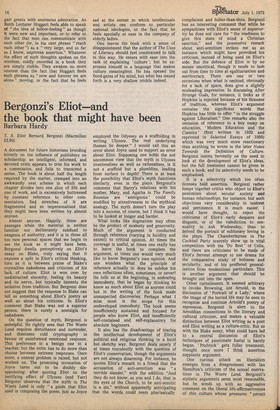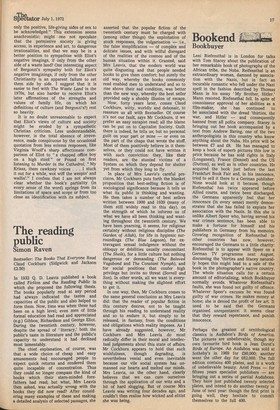Bergonzi's Eliot--and the book that might have been
Barbara Hardy
T. S. Eliot Bernard Bergonzi (Macmillan £3.50) A document for future historians brooding bitterly on the influence of publishers on scholarship: an intelligent, informed, and devoted critic appears to trim his work to a commission, and fails to transcend a series. The book is about half the length required by the matter, cramped into an awkwardly neat scheme in which each chapter divides into one slice of life and one of work, and is excessively buttressed by constant reference to other commentators. Sad, stretches of it are fragmented and so impersonalised that they might have been written by almost anyone.
Almost anyone. Happily, there are passages when the material is neither familiar nor deliberately subdued to exegesis of authority, and it is in these all too rare personal spaces that we begin to see the book as it might have been. Bergonzi dwells perceptively on Eliot's essay on Blake, truly saying that it exposes a split in Eliot's critical thinking, torn as it is between praise of Blake's crystalline nakedness and criticism of his lack of culture. Eliot is won over by undistracted sincerity, feeling its beauty and its nerve, but typically laments the isolation from tradition. But Bergonzi does not suggest that the response to Blake can tell us something about Eliot's poetry as well as about his criticism. In Eliot's comment that Blake was not a superior person, there is surely a nostalgia for nakedness.
On the question of myth, Bergonzi is unhelpful. He rightly sees that The Waste Land requires disturbance and surrender, and dismisses cold cryptography in favour of uninformed emotional response. This preference is a benign one in a teacher, but the critic has to do more than choose between extreme responses. Once more, a central problem is raised, but not worked on. The promising invocation of Joyce turns out to be doubly disappointing: after quoting Eliot on the terrifying effect of Ulysses (and Tarr) Bergonzi observes that the myth in The Waste Land is only "a guide that Eliot used in composing the poem, just as Joyce employed the Odyssey as a scaffolding in writing Ulysses. The real underlying themes lie deeper." I would call this an error about Joyce used to support an error about Eliot. Supposing one holds the not uncommon view that the myth in Ulysses irrationalises as well as rationalises, is it not a scaffold but a plumbline, leading from surface to depth? There is at least the possibility that Eliot's myth functions similarly, even in the plays. Bergonzi's comment that Harry's relations with his mother, Mary, and Agatha in The Family Reunion are ' ambiguous ' could be modified by attentiveness to the mythical analogy. The myth doesn't turn the play into a success, of course, but I think it has to be looked at longer and harder.
What looks like dogmatism may often be the product of modesty and generosity. Much of the argument is conducted through reference (varying in lucidity and extent) to critical opinion. At times the coverage is useful, at times one really has to leave the book to complete the argument, at times one would very much like to know Bergonzi's own opinion. And one wonders what the principle of reference actually is: does he subdue his own reflections often, sometimes, or never? He tells us at the beginning, in endearing immodesty, that he began by thinking he knew as much about Eliot as anyone could but in the writing of the book made unsuspected discoveries. Perhaps what I miss most is the scope for this undeveloped immodesty. The book seems insufficiently sustained and focused for people who know Eliot, and insufficiently self-contained and self-explanatory for absolute beginners.
It also has the disadvantage of tracing the intellectual development of Eliot's political and religious thinking in a lucid but sketchy way. Bergonzi deals sanely if at times truculently with the question of Eliot's conservatism, though the arguments are not always disarming. For instance, he quotes Eliot's remark to a friend that the accusation of anti-semitism was "a terrible slander," with the addition "And they do not know, as you and I do, that in the eyes of the Church, to be anti-semitic is a sin," without apparently anticipating that the words could seem pharisaically complacent and holier-than-thou. Bergonzi has an interesting comment that while he sympathises with Eliot's sense of superiority he does not care for "the readiness to give this state of mind a Christian sanction," and the possessive remark about anti-semitism strikes me as an instance which might have provoked his criticism, instead of being used on Eliot's side. But the defence of Eliot is by no means uncritical, though it tends to lash out from time to time at egalitarianism and meritocracy. There are one or two occasions when what is omitted, obviously for a lack of space, does give a slightly misleading impression. In discussing After Strange Gods, for instance, it looks as if Hopkins is rejected because of his thinness of tradition, whereas Eliot's argument contains the significant words that Hopkins has little to offer "in the struggle against Liberalism." One remarks also the omission of reference to a key essay on education, 'Modern Education and the Classics ' (first written in 1932 and reprinted in Selected Essays of 1950) which was very much more reactionary than anything he wrote in the later Notes Towards the Definition of Culture. Bergonzi insists fervently on the need to look at the development of Eliot's ideas, but the full treatment cannot be given in such a book, and its selectivity needs to be emphasised.
It is a selectivity which too often licenses bald assertion. Bergonzi rather lumps together critics who object to Eliot's pessimism about secular society and human relationships, for instance, but such objections vary considerably in interest and pertinence. It is much easier, I would have thought, to reject the criticisms of Eliot's early despairs and disgusts, or of the valediction to sensuality in Ash Wednesday, than to defend the portrait of sublunary loving in the plays. The Chamberlaynes in The Cocktail Party scarcely show up in vital competition with the 'Do Best' of Celia, and there are criticisms to be made of Eliot's fervent attempt to use drama for the comparative study of holiness and secularity, and of his proffered generalisation from tendentious particulars. This is another argument that should be brought out into the open.
Other curtailments. It seemed arbitrary to invoke Browning, not Arnold, in the discussion of Portrait of a Lady,' where the image of the buried life may be seen to recognise and continue Arnold's poetry of repression. Bergonzi is alert to the Arnoldian connections in the literary and cultural criticism, and makes a valuable distinction between Eliot writing as a poet and Eliot writing as a culture-critic. But as with the Blake essay, what could have led to a central discussion of Eliot's techniques of passionate burial is barely begun. Pruf rock' gets fuller treatment, thought once more I think assertion supplants argument.
One curious attack on liberalism emerges from a disagreement with Ian Hamilton's criticism of the sexual enervadons in The Waste Land. Bergonzi's stylistic arguments seem most reasonable, but he winds up with an aggressive comment on the liberal life-affirmativeness of this culture whose pressures "permit only the positive, life-giving sides of sex to be acknowledged." This extension seems anachronistic: might one not speculate that the permissive society is giving access, in experience and art, to dangerous irrationalities, and that we may be in a better position to sympathise with Eliot's negative imagings, if only from the other side of a waste land? One interesting aspect of Bergonzi's sympathy both for Eliot's negative imaginings, if only from the other Christianity is an apparent failure to set them side by side. I suggest that it is easier to feel with The Waste Land in the 1970s, but also harder to receive Eliot's later affirmations of the strengths and values of family life, on which his definitions of culture (and Bergonzi's?) rest so heavily.
It is no doubt unreasonable to expect that Eliot's views of culture and society might be eroded by a sympathetic Christian criticism. Less understandable, however, is the total absence of irreverence, made conspicuous by the occasional quotation from less solemn responses, like Virginia Woolf's sharp affectionate comparison of Eliot to "a chapped office boy on a high stool" or Pound on first listening to Murder in the Cathedral, "My Krissz, them cawkney voices . . . I stuck it out for a while, wot wiff the weepin' and wailin'." I confess that I am not always clear whether the book's partiality (in every sense of the word) springs from its limitations of space and scope or from too close an identification with its subject.























































 Previous page
Previous page